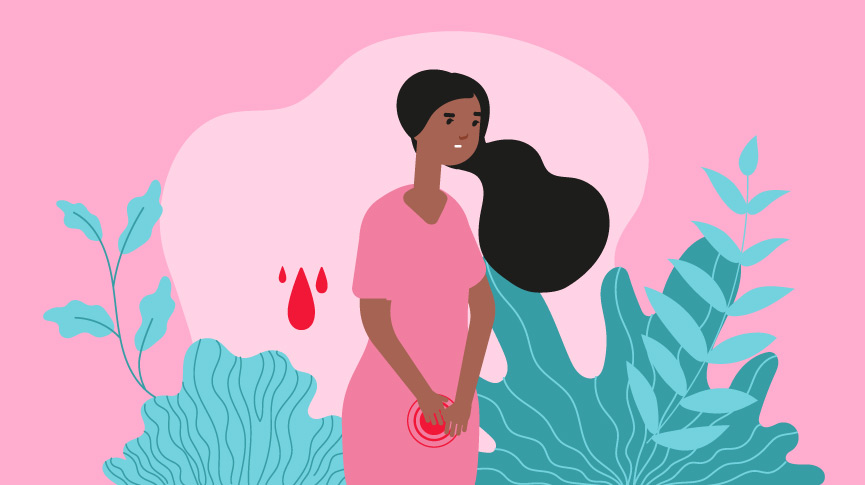Here We Go Again: Postpartum Periods

Pregnancy is a wild ride. You may be looking in the mirror at a body that you barely recognize. A person that has been transformed by the creation of life.
Although many things have changed, some are starting to go back to “normal”. Whatever that means when you have a new baby!
One thing you might be wondering is when your Aunt Flow is going to visit again.
It’s likely been around a year since your last period, and you’re wondering just when and what to expect.
When Will I Get My Period After Pregnancy?
Whether you had a vaginal birth or cesarean section, you’ve probably experienced some light “bleeding”, darker discharge, or spotting after birth. This is called lochia, and is similar to a period but only occurs immediately after giving birth, and in the weeks after.
The average person gets their period about six to eight weeks after giving birth. However, this can vary from person to person, and even more so if you’re lactating. More on that later.
The bottom line is that there’s no exact answer. As much as we’d love to give you some clarity on the matter, every person is different, and there are so many other variables to take into account.
Like lactation.
Periods and Lactation
You’ve probably heard the old wives saying “You can’t get pregnant when you’re nursing!”
That’s not entirely true, but there is some truth to it.
The hormone prolactin is responsible for producing human milk, and also happens to suppress reproductive hormones. This might keep ovulation from occurring.
This is true whether you’re breastfeeding/chestfeeding, pumping, or some combination of the two.
Keep in mind that some people get their period while lactating, and in the same vein – some people get pregnant before getting their period postpartum.
Pregnant Without a Period
If you’re not planning on popping out another one anytime soon, you’ve probably got birth control on your mind.
Here’s your reminder that it’s totally possible to get pregnant again before your period comes back.
This is because your body ovulates before a period as part of your menstrual cycle. If you happen to have sex during this time, you may find yourself pregnant again before your period ever returns.
If you want to avoid this, you can get an IUD inserted immediately after giving birth, or at your follow up appointment, which is usually six weeks postpartum.
Some hormonal birth control options are considered safe while lactating, you can ask your healthcare provider for more information.
Another option is to use good old fashioned barrier methods like condoms or diaphragms. Although they aren’t quite as effective as an IUD.
If sex is the last thing on your mind – no worries. Everyone has their own timeline when it comes to sex after pregnancy.
What to Expect: Postpartum Periods
It’s been a long time since your last period, and you might be feeling apprehensive.
There’s no way to tell you exactly what to expect, but it’s definitely possible that your first period back is different from what you remember.
Some other menstrual changes you might notice are:
- Small blood clots
- Changes in cramps
- Painful periods
- A heavier flow
- A period that “stops and starts”
- Spotting
If your period is more painful after pregnancy than it used to be, that could be in part due to an increased amount of uterine lining that needs to be shed. Hormones also play a role in period cramps, and yours are still adjusting to life postpartum.
It may take some time for your period to become regular again after pregnancy. If you’re wanting to tap back into your menstrual cycle, you can try keeping a cycle journal or using a handy app on your phone.
Contact your healthcare provider if you experience any of these symptoms during your period:
- A severe headache
- Bleeding continuously for more than a week
- Soaking through a pad every hour
- Blood clots that are bigger than a softball
- Sudden and severe pain
- Pain while urinating
Period Products Postpartum
As things are still healing, you might want to avoid periods cups, and tampons for your first menstrual cycle postpartum. You can ask your healthcare provider for more information, and opt for pads for this first time back in the period saddle.
After that, you can go back to using your favorite period cup!
Postpartum Periods After Pregnancy Loss
It’s important to acknowledge that the menstrual cycle is affected after pregnancy, no matter what the outcome of the pregnancy was.
If you experienced a pregnancy loss, whether that was a miscarriage, stillbirth, abortion, or chemical pregnancy – your experience is valid, and you can still get some insight from these tips.
Postpartum Periods and Self Care
The thought of self-care might seem pretty unattainable with a new human who is dependent on you. But just like before you got pregnant, you deserve self-care and rest (always), but especially while on your period.
Even if it’s just a quick warm shower by yourself, or a sneaky nap. Do what you can to give your body space to rest and recuperate.
Some other ways you can combat period pain are using a heating pad and trying these gentle yoga poses.

Natasha (she/her) is a full-spectrum doula and health+wellness copywriter. Her work focuses on deconstructing the shame, stigma, and barriers people carry around birth, sex, health, and beyond, to help people navigate through their lives with more education and empowerment. You can connect with Natasha on IG @natasha.s.weiss.



And, one of my personal advice (not first hand, but almost) – above all, listen to your body! Doing the talk with the body is important, asking questions, etc. Gotta says that your tips would make a good questionnaire in this situation;)